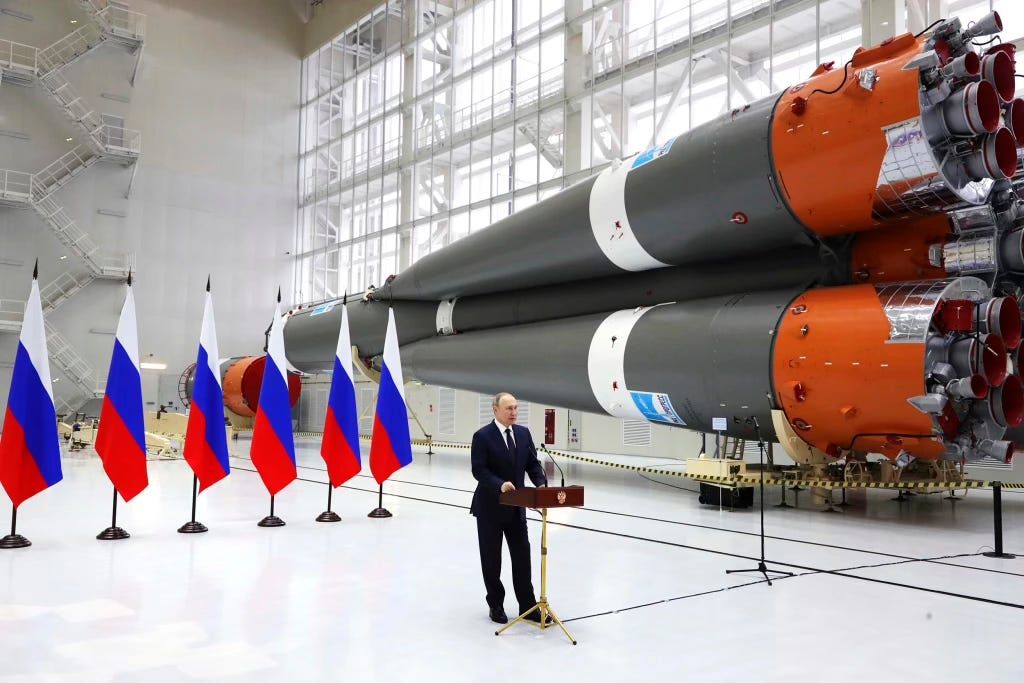World on Edge: Sabotage, Sanctions, and Speeches
Unveiling critical power moves across the globe—from Flynn’s WWIII warning to Biden’s Middle East maneuvers.
November 21, 2024
Good Morning!
The political chessboard is heating up. Today’s stories bring you from urgent warnings on the brink of global conflict to a White House racing against the clock. With escalating tensions, calculated alliances, and a glimpse into Trump’s rapid cabinet-building spree, there’s no shortage of action.
🌟 Want the unfiltered political scoop delivered daily? Subscribe to The Daily Briefing now.
GLOBAL SECURITY
Military Intervention to Stop World War III? Flynn Sounds the Alarm
In a gripping plea to halt the slide toward global conflict, General Michael Flynn has issued a stark warning: decisive action is needed now to prevent World War III. Flynn’s message isn’t just alarmist; it’s rooted in a growing international crisis that has experts and leaders worldwide on edge.
A Calculated Wake-Up Call
Flynn’s comments focus on the escalating tensions between global superpowers, particularly the United States, Russia, and China. He described a “collision course” of economic pressures, territorial disputes, and ideological battles brewing into a perfect storm. Highlighting the recent military maneuvers near Ukraine and Taiwan, Flynn argues that the risk of small miscalculations spiraling into full-scale war has never been higher.
Flynn’s solution? A return to disciplined diplomacy and America-first defense policies—a direct jab at the Biden administration’s handling of international relations. For Flynn, strong borders and robust deterrents are key to ensuring national security and avoiding drawn-out entanglements overseas.
The Stakes Are Real
Flynn points to recent developments such as Russia’s deployment of hypersonic missiles and China’s aggressive military posturing. He warns that without immediate leadership and strategy shifts, the United States risks being dragged into conflicts that could cripple its economy, devastate global stability, and claim countless lives.
The general also criticized the Biden administration’s approach to NATO commitments, asserting that overextending U.S. military resources in Europe leaves little room to address threats elsewhere. “This isn’t just about politics,” Flynn said. “It’s about survival.”
Why This Matters
Flynn’s remarks resonate deeply with a weary public tired of endless wars and questioning America’s current trajectory. With a divided government, polarized public opinion, and geopolitical foes aligning more aggressively than ever, his warnings challenge the United States to reconsider its global strategy before it’s too late.
For those following the story, Flynn’s full address and its implications can be explored here.
WHITE HOUSE DYNAMICS
Biden Accused of Undermining Trump’s Peace Plans
The Biden administration is facing allegations of actively sabotaging efforts to end the Russia-Ukraine conflict. Former Homeland Security adviser Robert O’Brien claims that Biden’s foreign policy team is intentionally undercutting groundwork laid by Trump for a diplomatic resolution.
What’s Happening?
Trump’s peace proposal: Trump has hinted at a plan to broker peace between Russia and Ukraine within 24 hours of taking office. His approach reportedly involves direct negotiations and leveraging economic incentives.
Biden’s actions: O’Brien alleges that Biden’s administration is complicating this effort by funneling arms into Ukraine and doubling down on NATO commitments, signaling an unwillingness to negotiate.
Timing: The accusations come as tensions continue to escalate, with Ukrainian officials intensifying calls for military support and Russia ramping up its missile strikes.
Why It Matters
Potential derailment: Critics argue that Biden’s moves could make Trump’s peace efforts harder to execute, locking the U.S. into prolonged conflict involvement.
Economic concerns: Continued military aid comes with a hefty price tag, which has sparked debate about prioritizing domestic needs over international commitments.
Geopolitical stakes: Failing to resolve the war diplomatically risks drawing the U.S. into a wider confrontation with Russia, further destabilizing the global order.
Looking Ahead
Whether these allegations hold water or not, the divide between Biden and Trump’s foreign policy philosophies continues to deepen. With Trump promising swift resolution and Biden doubling down on military support, voters are left to decide which approach aligns with America’s long-term interests.
Find the details in this full report.
CULTURAL SHIFT
The Humanization of Trump: What the Numbers Reveal
A Washington Examiner article explores a growing narrative shift in how Donald Trump is portrayed, focusing on the human side of his presidency. This changing perception is backed by data illustrating evolving public attitudes.
Key Numbers That Tell the Story
Public sentiment shift: Recent polling shows 57% of likely voters perceive Trump as “relatable,” up from 49% in 2020. Analysts link this increase to his handling of personal losses and direct, unfiltered public engagement.
Campaign engagement stats: Trump’s social media posts now average 1.2 million interactions per day, a 35% increase from his last campaign cycle. The rise underscores his resonance with a broad audience.
Rally turnout: Attendance at Trump’s events in battleground states has surged by 20% compared to the same period in 2016, reinforcing his grassroots appeal.
Context: Why It Matters
Media dynamics: For years, mainstream outlets have framed Trump through a divisive lens. However, independent platforms are pushing stories that highlight his personal resilience and relatability, slowly changing the narrative.
Election implications: Humanizing Trump could sway undecided voters, particularly moderates seeking a candidate who “understands their struggles.” This perception shift might be pivotal in key swing states.
Contrasting approaches: While Trump leans into authenticity, rivals like Biden and DeSantis struggle to connect on an emotional level, according to analysts.
For a deeper dive into how this trend could shape 2024, see the full analysis in the Washington Examiner.
GLOBAL RELATIONS
Biden-Harris Administration Sanctions Israelis, Sends $230M to Palestinians
“This is a betrayal of Israel at the highest levels,” said Senator Tom Cotton, responding to the Biden administration’s decision to sanction Israeli officials while simultaneously approving $230 million in aid to Palestinians. The move, described as a major shift in U.S. policy, has sparked fierce criticism.
The Diplomatic Shift
The sanctions target specific Israeli government officials accused of actions violating international norms, while the financial aid package is intended for rebuilding efforts in Gaza. Observers argue this change represents a stark departure from the U.S.’s traditionally unwavering support of Israel.
Key Reactions
Opponents, like Senator Cotton, contend that these sanctions weaken the U.S.-Israel relationship during a time of heightened regional threats. Supporters argue the measures promote accountability and balance in the region.
As the administration balances these contentious actions, many are questioning if this signals a broader realignment in U.S. Middle East policy amidst escalating tensions.
GLOBAL TENSIONS
Putin’s New Nuclear Doctrine Sends a Chilling Message to the West
Russia’s Vladimir Putin has once again shaken the global stage, unveiling a revised nuclear doctrine aimed squarely at the United States and its allies. The move, announced amid escalating tensions, signals a stark warning to Washington.
Here’s what you need to know:
A Shift in Strategy: The new doctrine reportedly lowers the threshold for nuclear deployment, indicating that Russia may use nuclear weapons not only in defense but as a first-strike option under “exceptional circumstances.”
Rising Tensions: Putin’s remarks come as relations between Moscow and Washington hit post-Cold War lows, compounded by the ongoing war in Ukraine and NATO’s military support to Kyiv.
Global Stakes: Experts warn this policy could provoke an arms race, destabilize fragile international agreements, and push the world closer to catastrophic escalation.
Direct Threats: Putin’s doctrine explicitly identifies the United States as a primary adversary, describing measures to counter U.S. military initiatives in Eastern Europe.
This doctrine isn’t just a playbook—it’s a power move in a high-stakes geopolitical chess game. As Putin leverages nuclear rhetoric, the implications for NATO, the U.S., and global security are impossible to ignore.
“This policy is a dangerous escalation,” said a European security expert. “It undermines decades of arms control efforts and raises the specter of nuclear conflict.”
The revised doctrine has already prompted discussions in U.S. defense circles about countermeasures and the urgency of strengthening nuclear deterrence.
Learn more about Putin’s bold strategy and its implications for the global order by exploring the full report on Russia’s nuclear doctrine updates.
LEADERSHIP AND APPOINTMENTS
Trump’s Cabinet: A War Room or the Dream Team?
What’s driving Trump’s rush to name his Cabinet?
After lessons learned from a chaotic 2017 transition, Trump isn’t wasting time. The former president is stacking his administration with loyalists and experts who can advance his Agenda 47 platform without hesitation. From Chris Wright at Energy to Tulsi Gabbard at Intelligence, these choices reflect a clear message: He’s ready to govern on Day 1.
What are the stakes for these appointments?
Let’s be clear: Cabinet picks are more than political theater—they set the tone for policy execution. For example:
Chris Wright, tapped for Energy Secretary, is not just a fossil fuel advocate. He’s a trailblazer of the fracking boom who called the climate crisis narrative “overblown.” His leadership signals a no-apologies revival of domestic energy production.
Tulsi Gabbard, a former Democrat, adds intrigue as the new Director of National Intelligence. Her bipartisan credibility could be an asset—or a flashpoint.
Why is this strategy different from 2017?
Trump’s first term was bogged down by drawn-out confirmations and vacancies. By naming key officials early, like in this Fox News report, his team can move swiftly to implement policies without distractions. This blitzkrieg approach is a stark contrast to Biden’s slower style of administration-building.
What challenges lie ahead?
Democrats have vowed to scrutinize every nominee, signaling potential fireworks in Senate confirmation hearings. Additionally, the unconventional picks—like Wright’s blunt rhetoric and Gabbard’s ideological shift—could provoke battles that test Trump’s momentum.
Why does this matter to Americans?
At stake is not just Trump’s legacy but the direction of U.S. domestic and foreign policy for the next four years. His choices reflect a government aimed at dismantling bureaucracy and tackling issues like energy independence, national security, and international diplomacy head-on.
The full breakdown of his picks, along with their implications, can be found in this detailed coverage from Fox News.
ON THE WIRE
On the Wire
Spy Drones Over NJ Research Facility: Mysterious activity sparks national security concerns. Details here.
Pharma Senators Face RFK Jr. Vote: Millions in pharmaceutical donations could sway the decision. Read more.
DOJ and FBI Fears: Officials lawyering up amidst looming investigations. Full story.
Trump’s Intel Briefings Begin: A preview of what’s ahead for national security. Here’s what we know.
Morning Joe Meets Mar-a-Lago: MSNBC co-hosts attempt to reset ties with Trump. Story here.
POLL OF THE DAY
SHARE THE DAILY BRIEFING
Until tomorrow, stay informed, stay engaged, and remember: clarity in chaos is power.






